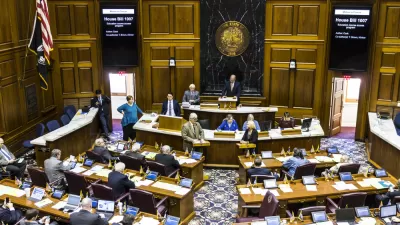Now that voters have decisively rejected a sales tax measure that would have also hiked the gas tax, House representatives have proposed eliminating the state's Earned Income Tax Credit that benefits the working poor to help pay for roads.
Michigan legislators are getting desperate to find funding to address the state's "terrible roads" after voters rejected Proposition 1 by a 80 percent to 20 percent margin last month. We knew they were planning to resort to using so-called surplus general funds for roads, but the extent of diversion is truly surprising and upsetting to some public policy experts.
"The Michigan House approved a plan to shift hundreds of millions of dollars from the state's general fund and make other changes aimed at putting nearly $1.2 billion a year toward repairing the state's roads," writes Brian McGillivary of the Traverse City Eagle-Record. "Lawmakers also found $117 million through the elimination of the state Earned Income Tax Credit."
"The Michigan Earned Income Tax Credit lets working families who earn low wages or who have fallen on hard times keep more of what they earn to afford the basics," according to the Michigan League for Public Policy.
Eliminating the EITC to pay for roads amounts to robbing Peter to pay Paul. The $117 million saved by eliminating the credit is a drop in the bucket of a $1 billion plus transportation plan, but a huge amount to families who need the credit to make ends meet.
Democrat Jon Hoadley of Kalamazoo described the elimination of the EITC as "filling potholes at the expense of the poor," reported CBS Detroit.
To be sure, the "House road package" [PDF] does include increases in user fees, though not the gasoline tax, reports McGillivary.
The plan would raise the diesel tax to 19 cents from 15 cents to match the gas tax and index both taxes to inflation. Registration fees would be raised by $30 on certain hybrid vehicles and by $100 on electric vehicles.
The largest amount of funds in the House road plan will come from the diversion of income tax funds according to the House fiscal agency memo [PDF]. Rather ironically, the plan also diverts tobacco settlement revenue so motorists can drive on better roads.
Doug Rothwell of Business Leaders for Michigan called for "a permanent, long-term solution to increase road repair funding without raiding the General Fund and hurting other critical priorities that are important to our economy," he told CBS. "The revenue should come from the users of our roads and bridges and be sufficient to ensure good quality road and bridge conditions."
FULL STORY: House diverts money toward roads

Alabama: Trump Terminates Settlements for Black Communities Harmed By Raw Sewage
Trump deemed the landmark civil rights agreement “illegal DEI and environmental justice policy.”

Study: Maui’s Plan to Convert Vacation Rentals to Long-Term Housing Could Cause Nearly $1 Billion Economic Loss
The plan would reduce visitor accommodation by 25% resulting in 1,900 jobs lost.

Why Should We Subsidize Public Transportation?
Many public transit agencies face financial stress due to rising costs, declining fare revenue, and declining subsidies. Transit advocates must provide a strong business case for increasing public transit funding.

Paris Bike Boom Leads to Steep Drop in Air Pollution
The French city’s air quality has improved dramatically in the past 20 years, coinciding with a growth in cycling.

Why Housing Costs More to Build in California Than in Texas
Hard costs like labor and materials combined with ‘soft’ costs such as permitting make building in the San Francisco Bay Area almost three times as costly as in Texas cities.

San Diego County Sees a Rise in Urban Coyotes
San Diego County experiences a rise in urban coyotes, as sightings become prevalent throughout its urban neighbourhoods and surrounding areas.
Urban Design for Planners 1: Software Tools
This six-course series explores essential urban design concepts using open source software and equips planners with the tools they need to participate fully in the urban design process.
Planning for Universal Design
Learn the tools for implementing Universal Design in planning regulations.
Smith Gee Studio
Alamo Area Metropolitan Planning Organization
City of Santa Clarita
Institute for Housing and Urban Development Studies (IHS)
City of Grandview
Harvard GSD Executive Education
Toledo-Lucas County Plan Commissions
Salt Lake City
NYU Wagner Graduate School of Public Service





























